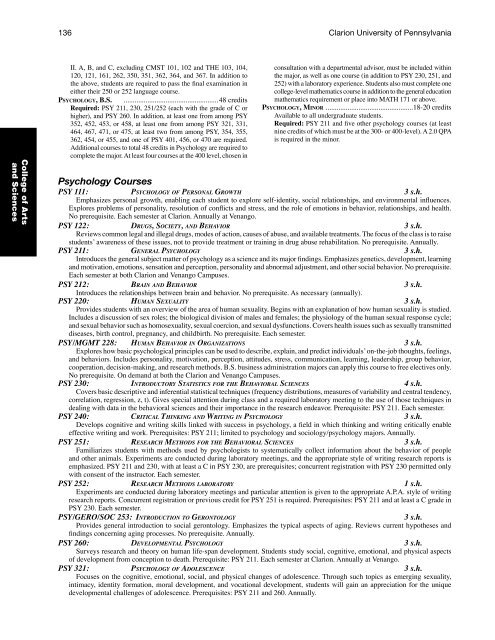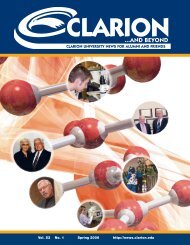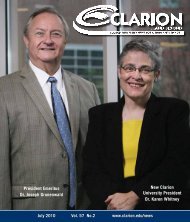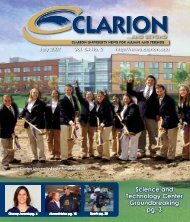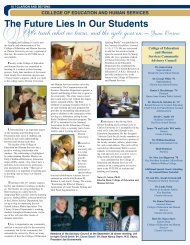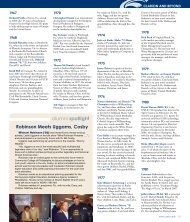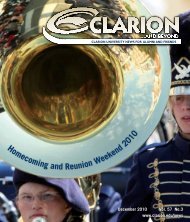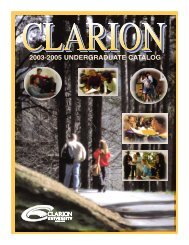Undergraduate - Clarion University
Undergraduate - Clarion University
Undergraduate - Clarion University
- No tags were found...
Create successful ePaper yourself
Turn your PDF publications into a flip-book with our unique Google optimized e-Paper software.
pages i-viiiCollege of Artsand Sciences136 <strong>Clarion</strong> <strong>University</strong> of PennsylvaniaII. A, B, and C, excluding CMST 101, 102 and THE 103, 104,120, 121, 161, 262, 350, 351, 362, 364, and 367. In addition tothe above, students are required to pass the final examination ineither their 250 or 252 language course......................................................48 creditsRequired: PSY 211, 230, 251/252 (each with the grade of C orhigher), and PSY 260. In addition, at least one from among PSY352, 452, 453, or 458, at least one from among PSY 321, 331,464, 467, 471, or 475, at least two from among PSY, 354, 355,362, 454, or 455, and one of PSY 401, 456, or 470 are required.Additional courses to total 48 credits in Psychology are required tocomplete the major. At least four courses at the 400 level, chosen inPsychology, B.S.consultation with a departmental advisor, must be included withinthe major, as well as one course (in addition to PSY 230, 251, and252) with a laboratory experience. Students also must complete onecollege-level mathematics course in addition to the general educationmathematics requirement or place into MATH 171 or above.Psychology, Minor ................................................18-20 creditsAvailable to all undergraduate students.Required: PSY 211 and five other psychology courses (at leastnine credits of which must be at the 300- or 400-level). A 2.0 QPAis required in the minor.Psychology CoursesPSY 111: Psychology of Personal Growth 3 s.h.Emphasizes personal growth, enabling each student to explore self-identity, social relationships, and environmental influences.Explores problems of personality, resolution of conflicts and stress, and the role of emotions in behavior, relationships, and health.No prerequisite. Each semester at <strong>Clarion</strong>. Annually at Venango.PSY 122: Drugs, Society, and Behavior 3 s.h.Reviews common legal and illegal drugs, modes of action, causes of abuse, and available treatments. The focus of the class is to raisestudents’ awareness of these issues, not to provide treatment or training in drug abuse rehabilitation. No prerequisite. Annually.PSY 211: General Psychology 3 s.h.Introduces the general subject matter of psychology as a science and its major findings. Emphasizes genetics, development, learningand motivation, emotions, sensation and perception, personality and abnormal adjustment, and other social behavior. No prerequisite.Each semester at both <strong>Clarion</strong> and Venango Campuses.PSY 212: Brain and Behavior 3 s.h.Introduces the relationships between brain and behavior. No prerequisite. As necessary (annually).PSY 220: Human Sexuality 3 s.h.Provides students with an overview of the area of human sexuality. Begins with an explanation of how human sexuality is studied.Includes a discussion of sex roles; the biological division of males and females; the physiology of the human sexual response cycle;and sexual behavior such as homosexuality, sexual coercion, and sexual dysfunctions. Covers health issues such as sexually transmitteddiseases, birth control, pregnancy, and childbirth. No prerequisite. Each semester.PSY/MGMT 228: Human Behavior in Organizations 3 s.h.Explores how basic psychological principles can be used to describe, explain, and predict individuals’ on-the-job thoughts, feelings,and behaviors. Includes personality, motivation, perception, attitudes, stress, communication, learning, leadership, group behavior,cooperation, decision-making, and research methods. B.S. business administration majors can apply this course to free electives only.No prerequisite. On demand at both the <strong>Clarion</strong> and Venango Campuses.PSY 230: Introductory Statistics for the Behavioral Sciences 4 s.h.Covers basic descriptive and inferential statistical techniques (frequency distributions, measures of variability and central tendency,correlation, regression, z, t). Gives special attention during class and a required laboratory meeting to the use of those techniques indealing with data in the behavioral sciences and their importance in the research endeavor. Prerequisite: PSY 211. Each semester.PSY 240: Critical Thinking and Writing in Psychology 3 s.h.Develops cognitive and writing skills linked with success in psychology, a field in which thinking and writing critically enableeffective writing and work. Prerequisites: PSY 211; limited to psychology and sociology/psychology majors. Annually.PSY 251: Research Methods for the Behavioral Sciences 3 s.h.Familiarizes students with methods used by psychologists to systematically collect information about the behavior of peopleand other animals. Experiments are conducted during laboratory meetings, and the appropriate style of writing research reports isemphasized. PSY 211 and 230, with at least a C in PSY 230, are prerequisites; concurrent registration with PSY 230 permitted onlywith consent of the instructor. Each semester.PSY 252: Research Methods laboratory 1 s.h.Experiments are conducted during laboratory meetings and particular attention is given to the appropriate A.P.A. style of writingresearch reports. Concurrent registration or previous credit for PSY 251 is required. Prerequisites: PSY 211 and at least a C grade inPSY 230. Each semester.PSY/GERO/SOC 253: Introduction to Gerontology3 s.h.Provides general introduction to social gerontology. Emphasizes the typical aspects of aging. Reviews current hypotheses andfindings concerning aging processes. No prerequisite. Annually.PSY 260: Developmental Psychology 3 s.h.Surveys research and theory on human life-span development. Students study social, cognitive, emotional, and physical aspectsof development from conception to death. Prerequisite: PSY 211. Each semester at <strong>Clarion</strong>. Annually at Venango.PSY 321: Psychology of Adolescence 3 s.h.Focuses on the cognitive, emotional, social, and physical changes of adolescence. Through such topics as emerging sexuality,intimacy, identity formation, moral development, and vocational development, students will gain an appreciation for the uniquedevelopmental challenges of adolescence. Prerequisites: PSY 211 and 260. Annually.


